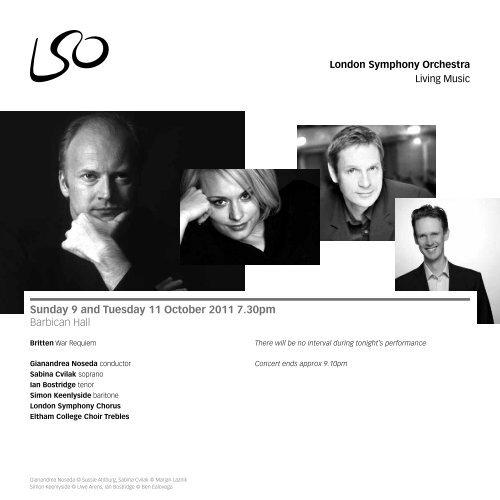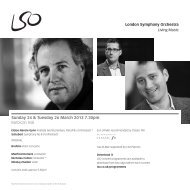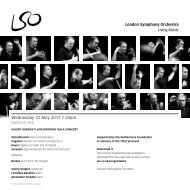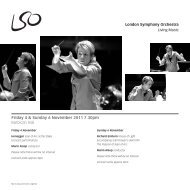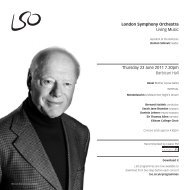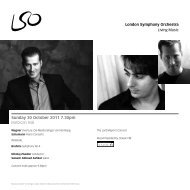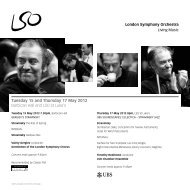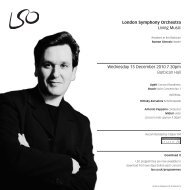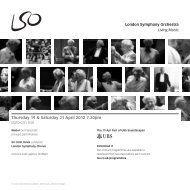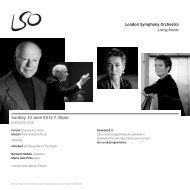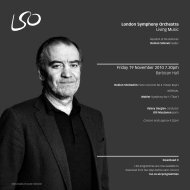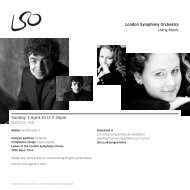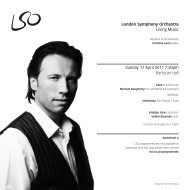9 Oct programme - London Symphony Orchestra
9 Oct programme - London Symphony Orchestra
9 Oct programme - London Symphony Orchestra
Create successful ePaper yourself
Turn your PDF publications into a flip-book with our unique Google optimized e-Paper software.
Sunday 9 and Tuesday 11 <strong>Oct</strong>ober 2011 7.30pm<br />
Barbican Hall<br />
Britten War Requiem<br />
Gianandrea Noseda conductor<br />
Sabina Cvilak soprano<br />
Ian Bostridge tenor<br />
Simon Keenlyside baritone<br />
<strong>London</strong> <strong>Symphony</strong> Chorus<br />
Eltham College Choir Trebles<br />
Gianandrea Noseda © Sussie Ahlburg, Sabina Cvilak © Marjan Laznik<br />
Simon Keenlyside © Uwe Arens, Ian Bostridge © Ben Ealovega<br />
<strong>London</strong> <strong>Symphony</strong> <strong>Orchestra</strong><br />
Living Music<br />
There will be no interval during tonight’s performance<br />
Concert ends approx 9.10pm
Welcome News<br />
Welcome to the Barbican where, in anticipation of the Britten<br />
centenary celebrations in 2013, we are delighted to present two<br />
performances of the composer’s War Requiem conducted by<br />
Gianandrea Noseda and featuring an outstanding line-up of solo<br />
singers alongside the LSO.<br />
This seminal work was first performed in Coventry Cathedral almost<br />
50 years ago, in 1962, to mark the building’s reconsecration after the<br />
original 14th-century structure was destroyed in World War II. Since<br />
then it has become a central part of the concert hall repertoire.<br />
It is a pleasure to welcome back to direct these performances<br />
Gianandrea Noseda (last with the LSO at the Barbican in <strong>Oct</strong>ober<br />
2010), a conductor with a particularly glowing reputation in the opera<br />
world. Joining him on stage are soprano Sabina Cvilak, baritone Simon<br />
Keenlyside and tenor Ian Bostridge. In a recently published feature<br />
article in The Guardian, Ian Bostridge wrote that ‘The Requiem is<br />
a masterpiece of the deepest emotional and moral depth‘ and a<br />
‘contraption of musical ingenuity’; in today’s volatile world it is as<br />
relevant now as it ever was.<br />
Kathryn McDowell<br />
LSO Managing Director<br />
Mahler <strong>Symphony</strong> No 9: ‘Outstanding Recording’<br />
We were delighted to hear that our LSO Live recording of Mahler’s<br />
Ninth <strong>Symphony</strong>, conducted by Valery Gergiev, was given the<br />
International Record Review’s Outstanding Recording award:<br />
‘Nothing can detract from the excellence of this disc:<br />
it is quite outstanding in every respect’<br />
The recording can be purchased online from the LSO website<br />
for £8.99.<br />
lso.co.uk/lsolive<br />
On tour in New York<br />
Later this month, the <strong>Orchestra</strong> will give three concerts at the<br />
Lincoln Center in New York, where it holds a residency. As well as<br />
performing tonight’s War Requiem <strong>programme</strong>, Sir Colin Davis will join<br />
the <strong>Orchestra</strong> for a reprise of Beethoven’s Missa Solemnis (greatly<br />
received at this year’s BBC Proms) and LSO favourite Nikolaj Znaider<br />
will take centre stage for the Sibelius Violin Concerto. Don’t forget to<br />
check the tour blog for all the latest from backstage!<br />
lso.co.uk/whatson<br />
lsoontour.wordpress.com<br />
Keep your finger on the Pulse with our Student Scheme<br />
The LSO is constantly striving to bring high quality music to as wide<br />
an audience as possible. One of the ways we do this is through<br />
our Student Ambassador Scheme, Pulse, an initiative which has<br />
already brought thousands of young adults closer to the LSO.<br />
Visit the webpage below to read all about it and download an<br />
information pack. A very warm welcome to all students attending<br />
the 11 <strong>Oct</strong>ober concert, one of a selection of designated Student<br />
Nights this season. We hope you enjoy it – be sure to drop us an<br />
email to let us know how you got on.<br />
lso.co.uk/pulse<br />
2 Welcome & News Kathryn McDowell © Camilla Panufnik
Benjamin Britten (1913–76)<br />
Composer Profile<br />
‘Composing is like driving down a foggy road<br />
toward a house. Slowly you see more details<br />
of the house – the colour of the slates and<br />
bricks, the shape of the windows. The notes<br />
are the bricks and the mortar.’<br />
Benjamin Britten<br />
Benjamin Britten received his first piano lessons from his mother,<br />
a prominent member of the Lowestoft Choral Society who also<br />
encouraged her son’s earliest efforts at composition. In 1924 he<br />
heard Frank Bridge’s tone-poem The Sea and began to study<br />
composition with him three years later. After leaving Gresham’s<br />
School, Holt, in 1930 he gained a scholarship to the Royal College<br />
of Music. Here he studied composition with John Ireland and piano<br />
with Arthur Benjamin. Britten attracted wide attention when he<br />
conducted the premiere of his ‘Simple’ <strong>Symphony</strong> in 1934. He worked<br />
for the GPO Film Unit and various theatre companies, collaborating<br />
with such writers as W H Auden and Christopher lsherwood.<br />
The first performance of his opera Peter Grimes on 7 June 1945<br />
opened the way for a series of magnificent stage works mainly<br />
conceived for the English Opera Group. In June 1948 Britten<br />
founded the Aldeburgh Festival of Music and the Arts, for which<br />
he subsequently wrote many new works. By the mid-1950s he was<br />
generally regarded as the leading British composer, helped by the<br />
international success of operas such as Albert Herring, Billy Budd<br />
and The Turn of the Screw. One of his greatest masterpieces,<br />
the War Requiem, was first performed on 30 May 1962 for the<br />
festival of consecration of St Michael’s Cathedral, Coventry:<br />
its anti-war message reflecting the composer’s pacifist beliefs.<br />
A remarkably prolific composer, Britten completed works in almost<br />
every genre and for a wide range of musical abilities, from those<br />
of schoolchildren and amateur singers to such artists as Mstislav<br />
Rostropovich, Julian Bream and Peter Pears.<br />
Composer Profile © Andrew Stewart<br />
Music’s better shared!<br />
There’s never been a better time to bring all your friends to an LSO concert.<br />
Groups of 10+ receive a 20% discount on all tickets, plus a host of<br />
additional benefits. Call the dedicated Group Booking Line on 020 7382 7211<br />
visit lso.co.uk/groups or email groups@barbican.org.uk<br />
On Sunday 9 <strong>Oct</strong>ober we welcome the Embassy of Slovenia, Mr A Mosley<br />
and friends and Ilsipario Musicale (Milan), and on Tuesday 11 <strong>Oct</strong>ober<br />
we welcome The Leys School (Cambridge), Latymer Upper School<br />
(Hammersmith) and Mr D Stewart and friends.<br />
Programme Notes<br />
3
Benjamin Britten<br />
War Requiem Op 66<br />
1 Requiem aeternam<br />
2 Dies Irae<br />
3 Offertorium<br />
4 Sanctus<br />
5 Agnus Dei<br />
6 Libera me<br />
Sabina Cvilak soprano<br />
Ian Bostridge tenor<br />
Simon Keenlyside baritone<br />
Although opera was to dominate Britten’s output subsequent to the<br />
success of Peter Grimes in 1945, the desire to write a major oratoriolike<br />
work had long been in his mind. In 1958 he was invited to write<br />
a work to celebrate the rebuilding of Coventry Cathedral, destroyed<br />
by bombing in 1941; and although he was given the choice of using a<br />
sacred or secular text, he soon decided that it would take the form of<br />
a Requiem. The decision to intersperse the text of the Requiem with<br />
poems by Wilfred Owen, who was killed in action one week before<br />
the end of World War I, was made soon after and they determined<br />
the character of the War Requiem, whose first performance took<br />
place on 30 May 1962.<br />
Britten had set Owen’s poem The Kind Ghosts in his Nocturne of 1958.<br />
Although one of Owen’s late poems, it has little of the darkness of<br />
most of his war poetry, and Britten’s setting is eloquent but restrained.<br />
It gives little indication of the way he would use Owen as counterpoint<br />
to the Requiem Mass, interleaving the poems and the Latin text with<br />
dramatic and often ironical effect, and contrasting the full orchestra<br />
with a chamber group which accompanies only the songs. ‘These<br />
magnificent poems’, Britten wrote to Dietrich Fischer-Dieskau,<br />
baritone solo in the first performance, ‘full of the hate of destruction,<br />
are a kind of commentary on the Mass … They will need singing with<br />
the utmost beauty, intensity and sincerity’.<br />
This ‘commentary on the Mass’ begins halfway through the first of<br />
the Requiem’s six movements. The solemn intoning of ‘Requiem<br />
aeternam’, with its dark bell-ridden textures, is interrupted first by the<br />
brightness of the boys’ chorus, and then by the first of Owen’s poems,<br />
4 Programme Notes<br />
sung by the tenor. ‘Eternal rest’ is the chorus’ plea, to be met by<br />
the fierceness of ‘What passing-bells for those who die as cattle?’.<br />
The chorus respond with a final ‘Kyrie’, which struggles towards a<br />
major chord – a gesture which will be repeated twice in the course<br />
of the work, but which offers little comfort.<br />
The Dies Irae is by some way the longest part of the War Requiem,<br />
and the most complex. Beginning with distant fanfares which sound<br />
as if they come from the battlefield, the chorus gradually builds<br />
until the fanfares break out with frightening force: the day of wrath<br />
is clearly a military action. As the violence dies away, the chamber<br />
orchestra takes up the music of the fanfares as the baritone solo<br />
intones ‘Bugles sang, saddening the evening air’. Now the soprano<br />
soloist enters for the first time: she is set apart from the other soloists<br />
by only singing the Latin text, here ‘Liber scriptus’ – the book which<br />
sets out the day of judgement, while the chorus respond as those<br />
who are judged.<br />
With ironic detachment both male soloists sing cheerily of death<br />
as ‘old chum … No soldier’s paid to kick against his powers’.<br />
The Latin text resumes with the gentle overlapping entries of the<br />
‘Recordare’, the women of the chorus, followed by the men’s<br />
aggressive ‘Confutatis maledictis’, spilling over into the baritone’s<br />
bitter portrayal of the ‘Great gun, towering towards Heaven, about<br />
to curse’. For the first time the main orchestra joins the chamber<br />
orchestra, with trumpet fanfares eventually bringing back a powerful<br />
reprise of the Dies Irae music.<br />
The transformation of the chorus’ forceful rhythms into the gentle<br />
lilt of the Lachrymae, in which the soprano joins, is masterly. And now<br />
Britten intersperses the words of the Requiem with the poignant<br />
verses of ‘Move him into the sun’, the final words bringing back<br />
the tolling bells of the opening and the second appearance of the<br />
chorus’ Kyrie music that ended the first part, here set to the words<br />
‘Dona eis requiem’.<br />
Three shorter parts follow. First the Offertorium, with the brightness<br />
of the boys’ chorus followed by the chorus, with what seems on the<br />
face of it an almost academic fugue setting of ‘Quam olim Abrahae’.
But the ‘promise to Abraham’ ushers in the most chilling of the Owen<br />
settings, where the two soloists tell the story of Abraham and Isaac.<br />
Here, for the voice of God, Britten quotes from his own setting of the<br />
story in his Second Canticle; but where in the bible story Abraham<br />
sacrifices a ram instead of his son, here ‘the old man would not<br />
so, but slew his son, – And half the seed of Europe one by one.’<br />
The mood is frighteningly ironic, and as the final phrase stutters<br />
into silence, the boys’ chorus is distantly heard; finally the chorus<br />
repeats the ‘Quam olim Abrahae’ fugue, almost in a whisper.<br />
‘These magnificent poems’,<br />
Britten wrote to Dietrich Fischer-Dieskau,<br />
baritone solo in the first performance,<br />
‘full of the hate of destruction, are a<br />
kind of commentary on the Mass …<br />
They will need singing with the<br />
utmost beauty, intensity and sincerity’.<br />
The Sanctus is perhaps the most conventional of the Requiem settings,<br />
with its declamatory soprano solo, triumphant brass fanfares for the<br />
Hosanna, and the measured tread of the Benedictus. So the spare<br />
textures of the baritone’s ‘After the blast of lightning from the East’<br />
contrast all the more strongly, and end this fourth part in darkness.<br />
The gentle and touching Agnus Dei is the quiet centre of the work,<br />
and here soprano, chorus and tenor soloist are united, as the rising<br />
and falling melody provides both the setting for the Latin text and the<br />
accompaniment to the tenor’s ‘One ever hangs where shelled roads<br />
part’, the roadside image of Christ uniting the two. For the only time<br />
in the work the soloist sings the final words in Latin, ‘Dona nobis<br />
pacem’ (give us peace).<br />
The final part brings both the longest concerted passage of choral<br />
and orchestral music, and by far the longest of the Owen settings,<br />
‘Strange Meeting’. The Libera me begins with muffled percussion<br />
in what Britten calls a march – almost a funeral march to begin with,<br />
but constantly accelerating until with what seems like inevitability<br />
the music of the Dies Irae returns, presaging a terrifying climax.<br />
Slowly dying away until only a sustained minor chord is left we enter<br />
Owen’s ‘profound dull tunnel’ where two enemy soldiers confront<br />
each other in death. Britten chose to omit several of Owen’s lines,<br />
including ‘I knew we stood in Hell’, perhaps because, after the<br />
reconciliation of the two soldiers and their final words, ‘Let us sleep<br />
now’, it would have contradicted the In paradisum of the boys’ chorus,<br />
in which all the forces quietly join. But there is to be no real resolution,<br />
as for the final time bells toll and the chorus ends the Requiem with<br />
its hushed and ambiguous refrain.<br />
Programme Note © Colin Matthews<br />
Colin Matthews was Associate Composer with the LSO from<br />
1992–99 and now acts as Composition Director for the<br />
LSO’s Panufnik Young Composers Scheme.<br />
Gianandrea Noseda returns<br />
Thu 21 Jun 7.30pm<br />
Beethoven <strong>Symphony</strong> No 5<br />
Gianandrea Noseda conductor<br />
Sponsored by BAT, Recommended by Classic FM<br />
<strong>London</strong> <strong>Symphony</strong> <strong>Orchestra</strong><br />
Living Music<br />
Tickets £10 to £35<br />
lso.co.uk<br />
Programme Notes<br />
5
Benjamin Britten<br />
War Requiem Op 66 – Libretto<br />
‘My subject is War, and the pity of War.<br />
The Poetry is in the pity. All a poet can do today is warn.’<br />
Wilfred Owen<br />
1 Requiem aeternam<br />
Chorus<br />
Requiem aeternam dona eis, Domine:<br />
et lux perpetua luceat eis.<br />
Rest eternal grant unto them, O Lord:<br />
and let light eternal shine upon them.<br />
Boys<br />
Te decet hymnus, Deus in Sion; et tibi reddetur votum in Jerusalem;<br />
exaudi orationem meam, ad te omnis caro veniet.<br />
Thou, O God, art praised in Sion; and unto Thee shall the vow<br />
be performed in Jerusalem; Thou who hearest the prayer,<br />
unto Thee shall all flesh come.<br />
Chorus<br />
Requiem …<br />
Rest …<br />
Tenor solo<br />
What passing-bells for these who die as cattle?<br />
Only the monstrous anger of the guns.<br />
Only the stuttering rifles’ rapid rattle<br />
Can patter out their hasty orisons.<br />
No mockeries for them from prayers or bells,<br />
Nor any voice of mourning save the choirs,<br />
The shrill, demented choirs of wailing shells;<br />
And bugles calling for them from sad shires.<br />
What candles may be held to speed them all?<br />
Not in the hands of boys, but in their eyes<br />
Shall shine the holy glimmers of good-byes.<br />
The pallor of girls’ brows shall be their pall;<br />
6 Libretto<br />
Their flowers the tenderness of silent minds,<br />
And each slow dusk a drawing-down of blinds.<br />
Chorus<br />
Kyrie eleison. Christe eleison. Kyrie eleison.<br />
Lord have mercy upon us. Christ have mercy upon us.<br />
Lord have mercy upon us.<br />
2 Dies irae<br />
Chorus<br />
Dies irae, dies illa,<br />
Solvet saeclum in favilla:<br />
Teste David cum Sibylla.<br />
Quantus tremor est futurus,<br />
Quando judex est venturus,<br />
Cuncta stricte discussurus!<br />
Tuba mirum spargens sonum<br />
Per sepulcra regionum,<br />
Coget omnes ante thronum.<br />
Mors stupebit et natura,<br />
Cum resurget creatura,<br />
Judicanti responsura.<br />
Day of wrath and doom impending,<br />
Heaven and earth in ashes ending!<br />
David’s words with Sibyl’s blending!<br />
Oh, what fear man’s bosom rendeth<br />
When from heaven the Judge descendeth,<br />
on whose sentence all dependeth!<br />
Wondrous sound the trumpet flingeth,<br />
through earth’s sepulchres it ringeth,<br />
all before the throne it bringeth,<br />
Death is struck and nature quaking,<br />
all creation is awaking,<br />
to its judge an answer making.
Baritone solo<br />
Bugles sang, saddening the evening air,<br />
And bugles answered, sorrowful to hear.<br />
Voices of boys were by the river-side.<br />
Sleep mothered them; and left the twilight sad.<br />
The shadow of the morrow weighed on men.<br />
Voices of old despondency resigned,<br />
Bowed by the shadow of the morrow, slept.<br />
Soprano solo and semi-chorus<br />
Liber scriptus proferetur,<br />
In quo totum continetur,<br />
Unde mundus judicetur.<br />
Judex ergo cum sedebit<br />
Quidquid latet apparebit:<br />
Nil inultum remanebit.<br />
Quid sum miser tunc dicturus?<br />
Quem patronum rogaturus?<br />
Cum vix justus sit securus.<br />
Rex tremendae majestatis,<br />
Qui salvandos salvas gratis,<br />
Salve me, fons pietatis.<br />
Lo! the book exactly worded,<br />
wherein all hath been recorded;<br />
thence shall judgement be awarded.<br />
When the judge his seat attaineth,<br />
and each hidden deed arraigneth,<br />
nothing unavenged remaineth.<br />
What shall I, frail man, be pleading?<br />
Who for me be interceding,<br />
when the just are mercy needing?<br />
King of majesty tremendous,<br />
who dost free salvation send us.<br />
Fount of pity, then befriend us!<br />
Tenor and baritone solos<br />
Out there, we’ve walked quite friendly up to Death;<br />
Sat down and eaten with him, cool and bland,<br />
Pardoned his spilling mess-tins in our hand.<br />
We’ve sniffed the green thick odour of his breath, –<br />
Our eyes wept, but our courage didn’t writhe.<br />
He’s spat at us with bullets and he’s coughed<br />
Shrapnel. We chorused when he sang aloft;<br />
We whistled while he shaved us with his scythe.<br />
Oh, Death was never enemy of ours!<br />
We laughed at him, we leagued with him, old chum.<br />
No soldier’s paid to kick against his powers.<br />
We laughed, knowing that better men would come,<br />
And greater wars; when each proud fighter brags<br />
He wars on Death – for Life; not men – for flags.<br />
Chorus<br />
Recordare Jesu pie,<br />
Quod sum causa tuae viae:<br />
Ne me perdes illa die.<br />
Quaerens me, sedisti lassus:<br />
Redemisti crucem passus:<br />
Tantus labor non sit cassus.<br />
Ingemisco, tamquam reus:<br />
Culpa rubet vultus meus:<br />
Supplicanti parce Deus.<br />
Qui Mariam absolvisti,<br />
Et latronem exaudisti,<br />
Mihi quoque spem dedisti.<br />
Inter oves locum praesta,<br />
Et ab haedis me sequestra,<br />
Statuens in parte dextra.<br />
Confutatis maledictis,<br />
Flammis acribus addictis,<br />
Voca me cum benedictis.<br />
Oro supplex et acclinis,<br />
Cor contritum quasi cinis:<br />
Gere curam mei finis.<br />
Libretto<br />
7
Think, kind Jesus – my salvation<br />
caused Thy wondrous incarnation;<br />
leave me not to reprobation.<br />
Faint and weary Thou hast sought me;<br />
on the cross of suffering bought me;<br />
shall such grace be vainly brought me?<br />
Guilty, now pour my moaning,<br />
all my shame with anguish owning;<br />
spare, O God, Thy suppliant groaning!<br />
Through the sinful Mary shriven,<br />
through the dying thief forgiven,<br />
Thou to me a hope hast given.<br />
With Thy sheep a place provide me,<br />
from the goats afar divide me,<br />
to Thy right hand do Thou guide me.<br />
When the wicked are confounded,<br />
doomed to flames of woe unbounded,<br />
call me, with Thy saints surrounded.<br />
Low I kneel with heart-submission;<br />
see, like ashes, my contrition!<br />
Help me in my last condition!<br />
Baritone solo<br />
Be slowly lifted up, thou long black arm,<br />
Great gun towering toward Heaven, about to curse;<br />
Reach at that arrogance which needs thy harm,<br />
And beat it down before its sins grow worse;<br />
But when thy spell be cast complete and whole,<br />
May God curse thee, and cut thee from our soul!<br />
8 Libretto<br />
Soprano solo and chorus<br />
Dies irae …<br />
Day of wrath …<br />
Lacrimosa dies illa,<br />
Qua resurget ex favilla<br />
Judicandus homo reus:<br />
Huic ergo parce Deus.<br />
Ah! that day of tears and mourning!<br />
From the dust of earth returning,<br />
Man for judgement must prepare him:<br />
Spare, O God, in mercy spare him!<br />
Tenor solo<br />
Move him into the sun –<br />
Gently its touch awoke him once,<br />
At home, whispering of fields unsown.<br />
Always it woke him, even in France,<br />
Until this morning and this snow.<br />
If anything might rouse him now<br />
The kind old sun will know.<br />
Think how it wakes the seeds, –<br />
Woke, once, the clays of a cold star.<br />
Are limbs, so dear-achieved, are sides,<br />
Full-nerved – still warm – too hard to stir?<br />
Was it for this the clay grew tall? –<br />
O what made fatuous sunbeams toil<br />
To break earth’s sleep at all?<br />
Soprano and chorus<br />
Lacrimosa …<br />
Ah! That day of tears …<br />
Chorus<br />
Pie Jesu Domine, dona eis requiem. Amen.<br />
Lord, all-pitying, Jesu blest, grant them rest. Amen.
3 Offertorium<br />
Boys<br />
Domine Jesu Christe, Rex gloriae, libera animas<br />
omnium fidelium defunctorum de poenis inferni,<br />
et de profundo lacu: libera eas de ore leonis,<br />
ne absorbeat eas tartarus, ne cadant in obscurum.<br />
O Lord Jesus Christ, King of Glory, deliver the souls of<br />
all the faithful departed from the pains of hell and from<br />
the depths of the pit: deliver them from the lion’s mouth,<br />
that hell devour them not, that they fall not into darkness.<br />
Chorus<br />
Sed signifer sanctus Michael repraesentet eas in<br />
lucem sanctam: quam olim Abrahae promisisti,<br />
et semini ejus.<br />
But let the standard-bearer Saint Michael bring them<br />
into the holy light: which, of old, Thou didst promise unto<br />
Abraham and his seed.<br />
Tenor and baritone solos<br />
So Abram rose, and clave the wood, and went,<br />
And took the fire with him, and a knife.<br />
And as they sojourned both of them together,<br />
Isaac the first-born spake and said, ‘My Father,<br />
Behold the preparations, fire and iron,<br />
But where the lamb for this burnt-offering?’<br />
Then Abram bound the youth with belts and straps,<br />
And builded parapets and trenches there,<br />
And stretched forth the knife to slay his son.<br />
When lo! an angel called him out of heaven,<br />
Saying, ‘Lay not thy hand upon the lad,<br />
Neither do anything to him. Behold,<br />
A ram, caught in a thicket by its horns;<br />
Offer the Ram of Pride instead of him.’<br />
But the old man would not so, but slew his son, –<br />
And half the seed of Europe, one by one.<br />
Boys<br />
Hostias et preces tibi Domine laudis offerimus: tu<br />
suscipe pro animabus illis, quarum hodie memoriam<br />
facimus: fac eas, Domine, de morte transire ad vitam.<br />
We offer unto Thee, O Lord, sacrifices of prayer and<br />
praise: do thou receive them for the souls of those<br />
whose memory we this day recall: make them,<br />
O Lord, to pass from death unto life.<br />
Chorus<br />
Quam olim Abrahae …<br />
Which, of old, Thou didst promise …<br />
4 Sanctus<br />
Soprano solo and chorus<br />
Sanctus, Sanctus, Sanctus Dominus Deus Sabaoth.<br />
Pleni sunt coeli et terra gloria tua.<br />
Hosanna in excelsis. Sanctus …<br />
Benedictus qui venit in nomine Domini.<br />
Hosanna in excelsis. Sanctus …<br />
Holy, Holy, Holy, Lord God of Sabaoth.<br />
Heaven and earth are full of Thy glory:<br />
Glory be to Thee. O Lord most high. Holy …<br />
Blessed is he that cometh in the name of the Lord.<br />
Glory be to Thee, O Lord most high. Holy …<br />
Baritone solo<br />
After the blast of lightning from the East,<br />
The flourish of loud clouds, the Chariot Throne;<br />
After the drums of Time have rolled and ceased.<br />
And by the bronze west long retreat is blown,<br />
Shall life renew these bodies? Of a truth<br />
All death will He annul, all tears assuage? –<br />
Fill the void veins of Life again with youth,<br />
And wash, with an immortal water, Age?<br />
Libretto<br />
9
When I do ask white Age he saith not so:<br />
‘My head hangs weighed with snow’.<br />
And when I hearken to the Earth, she saith:<br />
‘My fiery heart shrinks, aching. It is death.<br />
Mine ancient scars shall not be glorified.<br />
Nor my titanic tears, the sea, be dried’.<br />
5 Agnus Dei<br />
Tenor solo<br />
One ever hangs where shelled roads part.<br />
In this war He too lost a limb,<br />
But His disciples hide apart;<br />
And now the Soldiers bear with Him.<br />
Near Golgotha strolls many a priest,<br />
And in their faces there is pride<br />
That they were flesh-marked by the Beast<br />
By whom the gentle Christ’s denied.<br />
The scribes on all the people shove<br />
And bawl allegiance to the state,<br />
But they who love the greater love<br />
Lay down their life; they do not hate.<br />
Chorus<br />
Agnus Dei, qui tollis peccata mundi: dona eis<br />
requiem. Agnus Dei, qui tollis peccata mundi:<br />
dona eis requiem sempiternam.<br />
O Lamb of God, who takest away the sins of the world,<br />
grant them rest. O Lamb of God, who takest away the sins<br />
of the world, grant them eternal rest.<br />
Tenor solo<br />
Dona nobis pacem.<br />
Grant us Thy peace.<br />
10 Libretto<br />
6 Libera me<br />
Soprano solo and chorus<br />
Libera me, Domine, de morte aeterna, in die illa<br />
tremenda: quando coeli movendi sunt et terra:<br />
dum veneris judicare saeculum per ignem.<br />
Tremens factus sum ego et timeo, dum discussio<br />
venerit, atque ventura ira. Dies illa, dies irae,<br />
calamitatis et miseriae, dies magna et amara valde.<br />
Libera me, Domine …<br />
Deliver me, O Lord, from death eternal, in that fearful<br />
day: when the heavens and the earth shall be shaken:<br />
when Thou shalt come to judge the world by fire. I am in<br />
fear and trembling till the sifting be upon us, and the<br />
wrath to come. O that day, that day of wrath, of calamity<br />
and misery, a great day and exceeding bitter. Deliver me, O Lord …<br />
Tenor and baritone solos<br />
It seemed that out of battle I escaped<br />
Down some profound dull tunnel, long since scooped<br />
Through granites which titanic wars had groined.<br />
Yet also there encumbered sleepers groaned,<br />
Too fast in thought or death to be bestirred.<br />
Then, as I probed them, one sprang up, and stared<br />
With piteous recognition in fixed eyes,<br />
Lifting distressful hands as if to bless.<br />
And no guns thumped, or down the flues made moan.<br />
‘Strange friend,’ I said, ‘here is no cause to mourn’,<br />
‘None’, said the other, ‘save the undone years,<br />
The hopelessness. Whatever hope is yours,<br />
Was my Iife also; I went hunting wild<br />
After the wildest beauty in the world,
For by my glee might many men have laughed,<br />
And of my weeping something had been left,<br />
Which must die now. I mean the truth untold,<br />
The pity of war, the pity war distilled.<br />
Now men will go content with what we spoiled,<br />
Or, discontent, boil bloody, and be spilled.<br />
They will be swift with swiftness of the tigress,<br />
None will break ranks, though nations trek from progress.<br />
‘Miss we the march of this retreating world<br />
Into vain citadels that are not walled.<br />
Then, when much blood had clogged their chariot-wheels<br />
I would go up and wash them from sweet wells.<br />
‘Even from wells we sunk too deep for war,<br />
Even the sweetest wells that ever were.<br />
‘I am the enemy you killed, my friend.<br />
I knew you in this dark; for so you frowned<br />
Yesterday through me as you jabbed and killed.<br />
I parried; but my hands were loath and cold.<br />
Let us sleep now …’<br />
Boys, soprano solo and chorus<br />
In paradisum deducant te Angeli: in tuo adventu<br />
suscipiant te Martyres, et perducant te in civitatem<br />
sanctam Jerusalem. Chorus Angelorum te<br />
suscipiat, et cum Lazaro quondam paupere aeternam<br />
habeas requiem.<br />
Into Paradise may the Angels lead thee: at thy coming<br />
may the Martyrs receive thee, and bring thee into the holy<br />
city Jerusalem. May the Choir of Angels receive thee, and<br />
with Lazarus, once poor, mayest thou have eternal rest.<br />
Boys<br />
Requiem aeternam dona eis, Domine:<br />
et lux perpetua luceat eis.<br />
Rest eternal grant unto them, O Lord:<br />
and let light eternal shine upon them.<br />
Chorus<br />
Requiescant in pace. Amen.<br />
May they rest in peace. Amen.<br />
Reprinted by permission of Harold Owen and Chatto and Windus Ltd<br />
English text of Requiem Mass according to the English Missal<br />
Copyright 1961 by Boosey & Hawkes Music Publishers Ltd<br />
Reproduced by permission of Boosey & Hawkes Music Publishers Ltd.<br />
LSO Watch, Listen & Learn<br />
Are you part of a choir?<br />
<strong>London</strong> <strong>Symphony</strong> <strong>Orchestra</strong><br />
Living Music<br />
Would you like to sit in on Marin Alsop rehearsing<br />
the <strong>London</strong> <strong>Symphony</strong> Chorus ahead of her<br />
Joan of Arc Weekend in November?<br />
Email choral@lso.co.uk<br />
or call Fabienne Morris on 020 7382 2522<br />
to find out more about this exclusive opportunity<br />
Libretto<br />
11
Gianandrea Noseda<br />
Conductor<br />
‘Noseda gave the orchestra<br />
its head when necessary and<br />
they made a jubilant noise …<br />
obviously enjoying themselves<br />
under his leadership.’<br />
Seen and Heard on Noseda and the LSO,<br />
May 2008<br />
Gianandrea Noseda serves as Music Director<br />
of the Teatro Regio Torino, Chief Guest<br />
Conductor of the Israel Philharmonic and<br />
Conductor Laureate of the BBC Philharmonic<br />
in Manchester. Since 2001 he has been<br />
Artistic Director of the Stresa Festival, and<br />
was appointed Victor de Sabata Guest<br />
Conductor with the Pittsburgh <strong>Symphony</strong><br />
<strong>Orchestra</strong>. Noseda became the first<br />
foreign Principal Guest Conductor at the<br />
Mariinsky Theatre in 1997 and has been the<br />
Principal Guest Conductor of the Rotterdam<br />
Philharmonic and of the <strong>Orchestra</strong> Sinfonica<br />
Nazionale della RAI.<br />
Noseda regularly conducts many of the<br />
leading orchestras including the Chicago<br />
<strong>Symphony</strong>, New York Philharmonic, <strong>London</strong><br />
<strong>Symphony</strong> <strong>Orchestra</strong>, Philadelphia <strong>Orchestra</strong>,<br />
Swedish Radio <strong>Symphony</strong> <strong>Orchestra</strong>, Oslo<br />
Philharmonic, DSO Berlin, Frankfurt Radio<br />
<strong>Symphony</strong> <strong>Orchestra</strong>, Orchestre National<br />
de France, Orchestre de Paris and the NHK<br />
<strong>Symphony</strong> <strong>Orchestra</strong>. In future seasons<br />
he will make his debut with the Cleveland<br />
<strong>Orchestra</strong> and LA Philharmonic.<br />
As Music Director of the Teatro Regio<br />
Torino, Noseda has conducted many opera<br />
productions including Salome directed by<br />
Robert Carsen, Massenet’s Thaïs (available<br />
on Arthaus DVD), Verdi’s La traviata directed<br />
by Laurent Pelly and Mussorgsky’s Boris<br />
Godunov directed by Andrei Konchalovsky<br />
(Opus Arte DVD). In summer 2010 he led<br />
the Teatro Regio forces in their first ever<br />
residency in Japan and China and in May<br />
2011 he toured them in Spain and at the<br />
Théâtre des Champs-Elysées in Paris.<br />
Noseda’s privileged relationship with the<br />
Metropolitan Opera began in 2002 with<br />
Prokofiev’s War and Peace and has continued<br />
to this day with La forza del destino (2006),<br />
Un ballo in maschera (2007) and with new<br />
productions of Il trovatore (2009) and La<br />
traviata (2010). In June 2011 he conducted<br />
Lucia di Lammermoor on the Met’s Japan tour.<br />
Noseda’s intense collaboration with the<br />
BBC Philharmonic continues with studio<br />
recordings, subscription concerts at The<br />
Bridgewater Hall and annual appearances at<br />
the BBC Proms in <strong>London</strong>. Live performances<br />
of Beethoven’s complete symphonies from<br />
The Bridgewater Hall, Manchester by the BBC<br />
Philharmonic conducted by Noseda in 2005<br />
attracted the historical figure of 1.4 million<br />
download requests in a BBC trial which<br />
was offered as part of BBC Radio 3’s The<br />
Beethoven Experience.<br />
An exclusive Chandos artist since 2002,<br />
his discography includes Prokofiev, Karlowitz,<br />
Dvorˇák, Smetana, Shostakovich, Liszt’s<br />
Symphonic works, Rachmaninov (the operas<br />
and the symphonies), Mahler and Bartók.<br />
An extensive survey of the music of the<br />
Italian composers of the 20th century has<br />
included Respighi, Dallapiccola, Wolf-Ferrari<br />
(Diapason d’or in France) and Casella.<br />
He has also recorded for Deutsche<br />
Grammophon conducting the Vienna<br />
Philharmonic <strong>Orchestra</strong> in Anna Netrebko’s<br />
debut album and the Teatro Regio Torino<br />
<strong>Orchestra</strong> for a Mozart album featuring<br />
Ildebrando D’Arcangelo.<br />
Gianandrea Noseda is closely involved with<br />
the next generation of musicians through his<br />
tireless work with youth orchestras such as<br />
the <strong>Orchestra</strong> of the Royal College of Music<br />
in <strong>London</strong>, National Youth <strong>Orchestra</strong> of Great<br />
Britain and the <strong>Orchestra</strong> Giovanile Italiana.<br />
In summer 2010 he toured with the European<br />
Union Youth <strong>Orchestra</strong> throughout Europe.<br />
Gianandrea Noseda holds the honour<br />
of Cavaliere Ufficiale al Merito della<br />
Repubblica Italiana.<br />
12 The Artists Gianandrea Noseda © Sussie Ahlburg
Sabina Cvilak<br />
Soprano<br />
Sabina Cvilak is quickly becoming<br />
one of the world’s leading lyric<br />
sopranos, enjoying an international<br />
career in opera and concert. Her US<br />
debut as Mimì in La bohème at the<br />
Washington Opera (2008) reviewed<br />
by the Met Weekly, ‘Soprano Sabina<br />
Cvilak brings real pathos and<br />
presence to her Mimì and she is<br />
one of the best sopranos to grace<br />
the WNO in seasons’, was such a triumph that it brought her back to<br />
Washington to play Micaela in a new production of Bizet’s Carmen,<br />
and as Liù in a new production of Puccini’s Turandot the season after.<br />
She has worked with such eminent conductors as Bruno Aprea,<br />
Marco Armiliato, Semyon Bychkov, Placido Domingo, Mikko Franck,<br />
Daniel Harding, Marek Janowski, Fabio Luisi, George Pehlivanian,<br />
Peter Schneider, Emmanuel Villaume, Ralf Weikert, Keri-Lynn Willson<br />
and Simone Young.<br />
Her recent engagements have included La bohème (playing Mimì) at<br />
the Opera de Palma de Mallorca, at the Finnish National Opera and in<br />
Koeln, Otello (playing Desdemona) and Così fan tutte (playing Fiordiligi)<br />
at the Palm Beach Opera, Smetana’s The Bartered Bride (playing<br />
Marenka) in Valencia and Carmen (playing Micaela) in Pamplona,<br />
Beethoven’s <strong>Symphony</strong> No 9 with the Royal Scottish National<br />
<strong>Orchestra</strong> of Glasgow and War Requiem at the Festival de<br />
St Denis in Paris.<br />
Sabina Cvilak was born in Maribor (Slovenia) and graduated in<br />
Ljubljana where she studied with Annemarie Zeller and Kurt Widmer.<br />
Sabina Cvilak © Marjan Laznik, Ian Bostridge © Ben Ealovega<br />
Ian Bostridge<br />
Tenor<br />
Ian Bostridge was a post-doctoral<br />
fellow in history at Corpus Christi<br />
College, Oxford, before embarking<br />
on a full-time career as a singer.<br />
His international recital career<br />
includes the world’s major<br />
concert halls and the Edinburgh,<br />
Munich, Vienna, Aldeburgh and<br />
Schubertiade Festivals, including<br />
artistic residencies at the Vienna<br />
Konzerthaus, the Amsterdam Concertgebouw, the Barbican, Carnegie<br />
Hall, the Luxembourg Philharmonie and the Wigmore Hall.<br />
In opera he has sung Tamino and Jupiter in Semele and Aschenbach<br />
in Death in Venice at English National Opera, Quint in The Turn of the<br />
Screw, Don Ottavio in Don Giovanni and Caliban in The Tempest for<br />
the Royal Opera, Don Ottavio in Vienna and Nerone in L’Incoronazione<br />
di Poppea, Tom Rakewell in The Rake’s Progress, Male Chorus in<br />
The Rape of Lucretia in Munich and Aschenbach in Britten’s Death<br />
in Venice in Brussels and Luxembourg.<br />
His many award-winning recordings include Schubert with Graham<br />
Johnson (Gramophone Award 1996); Tom Rakewell with Sir John<br />
Eliot Gardiner (Grammy Award 1999); Schumann with Julius Drake<br />
(Gramophone Award 1998), The Turn of the Screw with Daniel Harding<br />
(Gramophone Award 2003) and Billy Budd (Grammy Award 2010).<br />
His concert engagements include the Berlin Philharmonic,<br />
Vienna Philharmonic, Chicago <strong>Symphony</strong>, Boston <strong>Symphony</strong>,<br />
BBC <strong>Symphony</strong>, Rotterdam Philharmonic, Royal Concertgebouw,<br />
New York Philharmonic and Los Angeles Philharmonic <strong>Orchestra</strong>s<br />
under such conductors as Sir Simon Rattle, Seiji Ozawa, Sir Colin<br />
Davis, Mstislav Rostropovich, Daniel Barenboim and James Levine.<br />
In January 2010 he sang the world premiere of Henze’s Opfergang<br />
with the Accademia Santa Cecilia in Rome under Antonio Pappano.<br />
In 2001 he was elected an honorary fellow of Corpus Christi College,<br />
Oxford. He was created a CBE in the 2004 New Year’s Honours.<br />
The Artists<br />
13
Simon Keenlyside<br />
Baritone<br />
Simon Keenlyside was born in<br />
<strong>London</strong>. He made his operatic<br />
debut with Hamburg State Opera<br />
as Count Almaviva in Mozart’s The<br />
Marriage of Figaro and has since<br />
sung an extensive repertoire with<br />
the world’s major opera companies<br />
and festivals. He won an Olivier<br />
Award in 2006 for both the title-role<br />
in Billy Budd for English National<br />
Opera and Winston in Lorin Maazel’s 1984 for the Royal Opera. His<br />
future operatic plans include Posa in La Traviata, Renato in Verdi’s<br />
Un ballo in maschera, the title roles in Rigoletto and Wozzeck, and<br />
Germont Père in La Traviata at the Vienna State Opera; the title roles<br />
in Eugene Onegin, Wozzeck and Don Giovanni at the Bayerische<br />
Staatsoper, Munich; Macbeth at the Deutsche Oper Berlin; and the<br />
roles of Germont Père, Eugene Onegin, Wozzeck, Count Almaviva<br />
and Rigoletto at the Royal Opera House.<br />
Simon enjoys extensive concert work under the baton of many leading<br />
conductors, appearing with the Chamber <strong>Orchestra</strong> of Europe, the<br />
Berlin and Vienna Philharmonic orchestras, the City of Birmingham and<br />
<strong>London</strong> <strong>Symphony</strong> <strong>Orchestra</strong>s, the Cleveland and Boston <strong>Symphony</strong><br />
<strong>Orchestra</strong>s, and the Philharmonia <strong>Orchestra</strong>. A renowned recitalist,<br />
Simon appears regularly in the world’s great recital venues, and has<br />
recorded four recital discs with Malcolm Martineau, of Schubert,<br />
Strauss, Brahms, and most recently, an English song disc to be released<br />
this autumn, as well as a disc of Schumann Lieder with Graham<br />
Johnson. He has also recorded Des Knaben Wunderhorn under Simon<br />
Rattle, the title role in Don Giovanni under Claudio Abbado, Carmina<br />
Burana under Christian Thielemann, Marcello in La Bohème under<br />
Riccardo Chailly, the title role in Billy Budd under Richard Hickox and<br />
Papageno in The Magic Flute under Charles Mackerras.<br />
In 2007 he was given the ECHO Klassik award for Male Singer of the<br />
Year, and in 2011, he was honoured with Musical America’s Vocalist<br />
of the Year Award. Simon was made a CBE in 2003.<br />
14 The Artists<br />
Eltham College Choir<br />
Trebles<br />
Under the direction of Alastair<br />
Tighe, the Eltham College Trebles<br />
are drawn from the Junior and<br />
Senior Schools of Eltham College<br />
in South <strong>London</strong>. Eltham College<br />
is an independent boys’ day<br />
school, with a co-educational sixth<br />
form, and was founded in 1842.<br />
The College excels academically<br />
and has an extensive extracurricular<br />
<strong>programme</strong>, with music and music-making at the heart<br />
of the College’s endeavours. The College Trebles are one of over 30<br />
ensembles which rehearse and perform regularly both at the College<br />
and elsewhere.<br />
Recently Eltham’s musicians have been heard at the Barbican,<br />
Royal Festival Hall, St Paul’s Cathedral, Cadogan Hall, St John’s,<br />
Smith Square, Blackheath Halls, Eltham Palace and the Old Royal Naval<br />
College, Greenwich. The Trebles have performed and recorded with<br />
the <strong>London</strong> <strong>Symphony</strong> <strong>Orchestra</strong> and <strong>London</strong> <strong>Symphony</strong> Chorus,<br />
under the direction of Valery Gergiev and Sir Colin Davis. They have<br />
also performed in Basel and Paris with the Mariinsky <strong>Orchestra</strong> and<br />
Chorus under the direction of Valery Gergiev, and performed with<br />
the Berlin Philharmonic conducted by Sir Simon Rattle during the<br />
orchestra’s residency in <strong>London</strong> earlier this year. They made their<br />
debut at the BBC Proms this summer in a performance of Havergal<br />
Brian’s Gothic <strong>Symphony</strong>.<br />
Simon Keenlyside © Uwe Arens
LSO Pulse<br />
Student Scheme – Welcome<br />
Welcome students…<br />
To the first LSO Pulse concert of the year! With seven successful<br />
seasons under our belt we are looking forward to another great<br />
year of student concerts, receptions, socialising, Aftershock<br />
(our classical club night) and finally, free drinks.<br />
LSO Pulse is a student scheme offering £6 tickets for selected LSO<br />
performances, which can be acquired through the convenience of<br />
your mobile phone (because we at LSO Pulse realise that daytime TV<br />
can be surprisingly time-consuming). By signing up, you will receive<br />
a unique pin code that will enable you to start purchasing student<br />
tickets for you and your chums. We also offer all our students the<br />
opportunity to become ambassadors, and work with the <strong>Orchestra</strong><br />
to promote LSO concerts and events in their university or college.<br />
In return for hard work, we give rewards to those who sell the most<br />
tickets including LSO Live downloads, Barbican vouchers, chances<br />
to meet soloists and conductors, a trip to Paris to watch the LSO<br />
perform, plus lots of general love/affection.<br />
So this 2011/12 season, for the bargain price of just £6, you could be<br />
transported (not literally) to 19th century Germany with performances<br />
showcasing the likes of Beethoven, Wagner, Strauss or another of<br />
those serious German Romantic types. Alternatively, if Russia’s more<br />
your thing, this season will not disappoint as Gergiev continues his<br />
thrilling celebration of Tchaikovsky – everyone’s favourite sugar<br />
plum fairy. And let us not forget February’s American extravaganza,<br />
featuring Copland’s Clarinet Concerto, Ellington’s swinging Harlem<br />
and music by Bernstein who wrote West Side Story.<br />
Just to reiterate, all of this is available to you for just £6 a ticket<br />
so please be sure to check for details of upcoming events on<br />
our website and Facebook pages. But for now, let me wish you<br />
a wonderful evening here at the Barbican!<br />
Stephanie Ramplin<br />
LSO Marketing Intern, administrator of LSO Pulse<br />
Like us on facebook<br />
bit.ly/pulsefacebook<br />
LSO Pulse<br />
15
LSO Pulse<br />
Student Programme Notes<br />
Britten’s War Requiem<br />
‘I hope it’ll make people think a bit’<br />
The year was 1962. The Cold War continued to rage as Soviets<br />
and Americans went head to head over the Cuban Missile Crisis,<br />
threatening nuclear conflicts that would affect the lives of people<br />
across the world. Fifties icon Marilyn Monroe was immortalised in<br />
print by artist Andy Warhol after her untimely death, following an<br />
alleged suicidal drug overdose. Exploding onto the popular music<br />
scene, the Beatles released their first single Love Me Do to screaming<br />
hoards of fans whilst American singer Bob Dylan continued to berate<br />
the bureaucracy, channelling anti-authoritarian attitudes into old-time<br />
American folk tunes. And across cities, thousands gathered to actively<br />
protest the war in Vietnam, calling for fighting to cease.<br />
During that same year Britten conceived the subject of tonight’s<br />
concert; his monumental War Requiem which premiered on 30 May<br />
1962, commemorating the 20 million lives lost during World War II<br />
only a few decades prior. With the 60s in full swing, the memory of<br />
the War had begun to fade away as society entered a new chapter<br />
where people witnessed social change and economic growth.<br />
Packed with bitter, poetical irony and brimming with dissonant military<br />
fanfares Britten’s War Requiem brought about a sober reminder of<br />
the futile and merciless nature of the war and, by implication, the<br />
many problems still permeating contemporary society. Employing the<br />
full force of the symphony orchestra, matched by a booming chorus,<br />
Britten constructs a poignant rumination on the pity of war, using the<br />
traditional Requiem as his vessel.<br />
16 LSO Pulse<br />
Benjamin Britten:<br />
The respectable outcast<br />
The son of a dentist and amateur musician, Britten spent his early<br />
years nestled in a quiet seaside town on the coast of Suffolk playing<br />
and writing music (cue obsession with the sea). Respectable next<br />
steps were a scholarship at the Royal College of Music and career<br />
in cinematic composition where he met anti-imperialist W H Auden<br />
with whom he collaborated on several musical projects. These early<br />
left-wing political explorations later grew into full-fledged pacifism for<br />
Britten who staunchly protested violence, choosing to veto his military<br />
service during World War II on the grounds that it was morally wrong.<br />
Sometime during the 1930s Britten also met Peter Pears who was to<br />
become his lifelong partner and muse, but struggled to fit in a society<br />
that misunderstood his sexuality as well as his political beliefs. These<br />
themes have been extensively explored by scholars, many of whom<br />
suggest Britten’s music to be an ‘allegory of his suppressed political/<br />
sexual voice’ etc, whether you subscribe to this view is up to you –<br />
let us just assume for now that Britten wrote music that was<br />
‘message’ orientated.<br />
Revolutionary motivations aside, Britten’s primary focus was to write<br />
music for ‘the people’ and he achieved real success as a composer,<br />
the zenith of which was reached with his opera Peter Grimes in 1945.<br />
Britten spent the next couple of decades composing more operas<br />
which continued to explore some of his favourite themes: outcasts<br />
and the sea.<br />
At the age of 48, Britten wrote the War Requiem, celebrating the 1962<br />
opening of the newly renovated Coventry Cathedral which had been<br />
destroyed during World War II bombings. Premiering to great popular<br />
acclaim, the War Requiem was hailed as a contemporary masterpiece,<br />
and has since become one of the few classical works written since 1945<br />
to enter into the fixed repertoire. Not bad for a sea-obsessed hermit.
Not your average requiem<br />
Britten’s War Requiem is a work of contrasts. Secular drama plays out<br />
against a sacred Mass, soloists are pitted against the choir, and war<br />
comes face to face with its adversaries. Having been given the choice<br />
between a sacred or secular text, Britten opted for a hybrid model<br />
using the traditional Latin Mass for the Dead as a framework (Missa<br />
pro defunctis in Latin) through which he interspersed a collection of<br />
modern poems by Wilfred Owen. Written in the trenches of World<br />
War I, Owen’s poetry provides an evocative, first-hand account of a<br />
desolate war to which he fell victim. One week before fighting ceased,<br />
Owen was killed in France. His family were notified of his death one<br />
hour after peace was declared.<br />
Owen’s poetry, first appearing halfway through the Requiem aeternam<br />
(Grant them eternal rest), is rich in imagery and allusion and provides<br />
a dramatic commentary that runs throughout the Requiem. Initially,<br />
the poetry challenges the sacred text, beginning with the tenor<br />
who asks the choir: ‘What passing-bells for those who die as cattle?’.<br />
Later, the tenor and baritone adopt a different approach by<br />
sarcastically discussing the futility of their mission in a cheery jaunt<br />
about ‘old chum’ death, accompanied by the chamber orchestra.<br />
However, it is during the retelling of the story of Abraham and Isaac<br />
during the Offertorium that Owen’s poetry speaks its most blunt and<br />
disturbing message. Here, the concluding lines of the poem – ‘But the<br />
old man would not so/but slew his son/And half the seed of Europe,<br />
one by one’ – tells of the leaders who sent their children off to war,<br />
summing up the chilling reality of the situation.<br />
Like Owen, Britten also makes use of a rich palette of imagery,<br />
portrayed through the combination of three separate ensembles.<br />
A lugubrious march-like passage in the lower strings sets the mood<br />
for the Requiem aeternam dominated by the tri-tone, most commonly<br />
known (thanks to a medieval monk) as the ‘devil’s interval’. Sweeping<br />
gestures in the brass recall the ominous approach of the cavalry<br />
and announce the arrival of the Dies irae (Day of wrath) building to<br />
a massive climax, bugles blaring out in full force. Snatches of snare,<br />
timpani and dissonant brass fanfare remain throughout, a constant<br />
allusion to the bayonets and bugles of Owen’s war. Following five<br />
movements of unrest, it is not until the final movement of the<br />
Requiem that all ensembles join together for the lines of Owen’s<br />
last poem, led by the tenor and baritone.<br />
When asked about his War Requiem, Britten often avoided<br />
commenting on the music but was not afraid to stress its significance,<br />
describing it as one of his ‘most important works’. Rarely choosing<br />
to discuss the musical merits of the composition, Britten remained<br />
modest in his responses, content in knowing that people had<br />
understood, as he explained to a friend, ‘the main point really’.<br />
Programme Note by Stephanie Ramplin<br />
LSO Marketing Intern, administrator of LSO Pulse<br />
Join us next time …<br />
… on Sunday 6 November when Marin Alsop conducts<br />
Richard Einhorn’s beautifully haunting score Voices of Light,<br />
accompanied by a silent film screening of Carl Dreyer’s<br />
The Passion of Joan of Arc – an emotional raw portrayal<br />
of the 15th-century heroine.<br />
Visit lso.co.uk/pulse for details<br />
Are you a student but not already<br />
a member of Pulse?<br />
Scan this QR code to join now, or text STUDENT to 60123<br />
LSO Pulse<br />
17
On stage<br />
First Violins<br />
Carmine Lauri<br />
Lennox Mackenzie<br />
Nigel Broadbent<br />
Ginette Decuyper<br />
Jörg Hammann<br />
Maxine Kwok-Adams<br />
Claire Parfitt<br />
Elizabeth Pigram<br />
Laurent Quenelle<br />
Harriet Rayfield<br />
Colin Renwick<br />
Ian Rhodes<br />
Sylvain Vasseur<br />
Rhys Watkins<br />
David Worswick<br />
Second Violins<br />
Thomas Norris<br />
Sarah Quinn<br />
Miya Vaisanen<br />
David Ballesteros<br />
Richard Blayden<br />
Matthew Gardner<br />
Philip Nolte<br />
Andrew Pollock<br />
Paul Robson<br />
Eleanor Fagg<br />
Stephen Rowlinson<br />
Julia Rumley<br />
Samantha Wickramasinghe<br />
18 The <strong>Orchestra</strong><br />
Violas<br />
Gillianne Haddow<br />
German Clavijo<br />
Anna Green<br />
Robert Turner<br />
Heather Wallington<br />
Jonathan Welch<br />
Michelle Bruil<br />
Elizabeth Butler<br />
Philip Hall<br />
Caroline O’Neill<br />
Fiona Opie<br />
Cellos<br />
Alastair Blayden<br />
Jennifer Brown<br />
Mary Bergin<br />
Noel Bradshaw<br />
Daniel Gardner<br />
Hilary Jones<br />
Minat Lyons<br />
Penny Driver<br />
Nicholas Gethin<br />
Double Basses<br />
Colin Paris<br />
Patrick Laurence<br />
Matthew Gibson<br />
Thomas Goodman<br />
Jani Pensola<br />
Nikita Naumov<br />
Simo Vaisanen<br />
Flutes<br />
Gareth Davies<br />
Patricia Moynihan<br />
Piccolo<br />
Sharon Williams<br />
Oboes<br />
Rachael Clegg<br />
Holly Randall<br />
Cor Anglais<br />
Christine Pendrill<br />
Clarinets<br />
Chris Richards<br />
Chi-Yu Mo<br />
E-flat Clarinet<br />
Chi-Yu Mo<br />
Bass Clarinet<br />
Katherine Lacy<br />
Bassoons<br />
Fany Maselli<br />
Joost Bosdijk<br />
Contra-bassoon<br />
Dominic Morgan<br />
Horns<br />
David Pyatt<br />
Angela Barnes<br />
Antonio Geremia Iezzi<br />
Jonathan Lipton<br />
Tim Ball<br />
Jeffrey Bryant<br />
Brendan Thomas<br />
Trumpets<br />
Philip Cobb<br />
Paul Mayes<br />
Gerald Ruddock<br />
Robin Totterdell<br />
Trombones<br />
Katy Jones<br />
James Maynard<br />
Bass Trombone<br />
Paul Milner<br />
Tuba<br />
Patrick Harrild<br />
Timpani<br />
Nigel Thomas<br />
Percussion<br />
Antoine Bedewi<br />
David Jackson<br />
Jeremy Cornes<br />
Benedict Hoffnung<br />
Christopher Thomas<br />
Sam Walton<br />
Piano<br />
John Alley<br />
Organ<br />
Catherine Edwards<br />
Chamber <strong>Orchestra</strong><br />
First Violin<br />
Roman Simovic Leader<br />
Second Violin<br />
Evgeny Grach<br />
Viola<br />
Edward Vanderspar<br />
Cello<br />
Rebecca Gilliver<br />
Double Bass<br />
Rinat Ibragimov<br />
Flute/Piccolo<br />
Adam Walker<br />
Oboe/Cor Anglais<br />
Juan Pechuan Ramirez<br />
Clarinet<br />
Andrew Marriner<br />
Bassoon<br />
Daniel Jemison<br />
Horn<br />
Timothy Jones<br />
Percussion<br />
Neil Percy<br />
Harp<br />
Bryn Lewis<br />
LSO String<br />
Experience Scheme<br />
Established in 1992, the<br />
LSO String Experience<br />
Scheme enables young string<br />
players at the start of their<br />
professional careers to gain<br />
work experience by playing in<br />
rehearsals and concerts with<br />
the LSO. The scheme auditions<br />
students from the <strong>London</strong><br />
music conservatoires, and 20<br />
students per year are selected<br />
to participate. The musicians<br />
are treated as professional<br />
’extra’ players (additional to<br />
LSO members) and receive<br />
fees for their work in line with<br />
LSO section players. Students<br />
of wind, brass or percussion<br />
instruments who are in their<br />
final year or on a postgraduate<br />
course at one of the <strong>London</strong><br />
conservatoires can also<br />
benefit from training with LSO<br />
musicians in a similar scheme.<br />
The Scheme is supported by:<br />
The Barbers’ Company<br />
The Carpenters’ Company<br />
Charles and Pascale Clark<br />
The Ironmongers’ Company<br />
LSO Friends<br />
Musicians Benevolent Fund<br />
The Polonsky Foundation<br />
Editor<br />
Edward Appleyard<br />
edward.appleyard@lso.co.uk<br />
Photography<br />
Mark Harrison, Kevin Leighton,<br />
Bill Robinson, Alberto Venzago,<br />
Nigel Wilkinson<br />
Print<br />
Cantate 020 7622 3401<br />
Advertising<br />
Cabbell Ltd 020 8971 8450
<strong>London</strong> <strong>Symphony</strong> Chorus<br />
President<br />
Sir Colin Davis CH<br />
President Emeritus<br />
André Previn KBE<br />
Vice Presidents<br />
Claudio Abbado<br />
Michael Tilson Thomas<br />
Patron<br />
Simon Russell Beale<br />
Chorus Director<br />
Joseph Cullen<br />
Chairman<br />
James Warbis<br />
Accompanist<br />
Roger Sayer<br />
The <strong>London</strong> <strong>Symphony</strong> Chorus was formed in 1966, and while maintaining<br />
special links with the <strong>London</strong> <strong>Symphony</strong> <strong>Orchestra</strong>, has also partnered<br />
the principal UK orchestras and internationally has worked with the Berlin<br />
and Vienna Philharmonic orchestras, Boston <strong>Symphony</strong> <strong>Orchestra</strong> and the<br />
European Union Youth <strong>Orchestra</strong>, among others.<br />
Along with regular appearances at the major <strong>London</strong> venues, the LSC<br />
tours extensively throughout Europe and has visited North America, Israel,<br />
Australia and the Far East. This season’s highlights include visits to Bonn,<br />
Paris and New York with the LSO under Sir Colin Davis and Gianandrea<br />
Noseda, and concerts with the BBC Philharmonic, BBC Scottish <strong>Symphony</strong><br />
<strong>Orchestra</strong> and the <strong>London</strong> <strong>Symphony</strong> <strong>Orchestra</strong>.<br />
The chorus has recorded widely, with recent releases including Haydn’s<br />
The Seasons, Walton’s Belshazzar’s Feast and Verdi’s Otello, and the world<br />
premiere issue of MacMillan’s St John Passion. The chorus also partners the<br />
LSO on Gergiev’s recordings of Mahler’s Symphonies Nos 2, 3 and 8, while<br />
the men of the chorus took part in the recent Gramophone award-winning<br />
recording of Götterdämmerung with the Hallé under Sir Mark Elder.<br />
In 2007, the <strong>London</strong> <strong>Symphony</strong> Chorus established its Choral Conducting<br />
Scholarships, which enable aspiring young conductors to gain valuable<br />
experience with a large symphonic chorus. The chorus has also<br />
commissioned new works from composers such as Sir John Tavener, Sir<br />
Peter Maxwell Davies, Michael Berkeley and Jonathan Dove, and took part<br />
in the world premiere of James MacMillan’s St John Passion with the LSO<br />
and Sir Colin Davis in 2008, and in the second <strong>London</strong> performance in<br />
February 2010.<br />
The <strong>London</strong> <strong>Symphony</strong> Chorus is always interested in recruiting new<br />
members, welcoming applications from singers of all backgrounds, subject<br />
to an audition. Open Rehearsals are also being held for those who might<br />
be interested in auditioning. For further information, call Helen Lawford,<br />
Auditions Secretary, on 020 8504 0295 or visit www.lsc.org.uk.<br />
Sopranos<br />
Kerry Baker, Angel Belsey, Julia Chan, Ann Cole,<br />
Shelagh Connolly, Lucy Craig, Emma Craven, Sara Daintree,<br />
Anna Daventry, Lucy Feldman, Lorna Flowers, Eileen Fox,<br />
Sarah Hall, Jessica Harris, Carolin Harvey, Emily Hoffnung*,<br />
Kuan Hon, Gladys Hosken, Claire Hussey, Debbie Jones*,<br />
Olivia Knibbs, Helen Lawford*, Clare Lovett, Meg Makower,<br />
Alison Marshall, Margarita Matusevich, Irene McGregor,<br />
Marta Lozano Molano, Jane Morley, Jeannie Morrison,<br />
Dorothy Nesbit, Jennifer Norman, Emily Norton,<br />
Maggie Owen, Isabel Paintin, Andra Patterson,<br />
Carole Radford, Liz Reeve, Sarah Rennix, Mikiko Ridd,<br />
Chen Shwartz, Bridget Snasdell, Amanda Thomas*,<br />
Rebecca Thomson, Isobel Timms<br />
Altos<br />
Liz Boyden, Gina Broderick*, Jo Buchan*, Lizzy Campbell,<br />
Sarah Castleton, Noel Chow, Rosie Chute, Liz Cole,<br />
Janette Daines, Zoe Davis, Maggie Donnelly, Diane Dwyer,<br />
Linda Evans, Lydia Frankenburg*, Amanda Freshwater,<br />
Tina Gibbs, Yoko Harada, Valerie Hood, Jo Houston,<br />
Lis Iles, Sue Jones, Vanessa Knapp, Gilly Lawson, Sue Lee,<br />
Selena Lemalu, Belinda Liao, Anne Loveluck, Aiofe McInerney,<br />
Caroline Mustill, Alex O’Shea, Susannah Priede, Lucy Reay,<br />
Clare Rowe, Maud Saint Sardos, Lis Smith, Jane Steele,<br />
Claire Trocmé, Curzon Tussaud, Agnes Vigh, Sara Williams,<br />
Mimi Zadeh, Magdalena Ziarko<br />
Tenors<br />
David Aldred, Paul Allatt, Robin Anderson, Antoine Carrier,<br />
John Farrington, Matt Fernando, Matthew Flood,<br />
Andrew Fuller*, Simon Goldman, Stephen Hogg,<br />
Warwick Hood, Tony Instrall, John Marks, Simon Marsh,<br />
Alastair Mathews, John Moses, Malcolm Nightingale,<br />
Rhydian Peters, Mattia Romani, Peter Sedgwick,<br />
Takeshi Stokoe, Richard Street, John Streit,<br />
Anthony Stutchbury, Malcolm Taylor, Owen Toller,<br />
James Warbis*, Brad Warburton, Robert Ward*,<br />
Paul Williams-Burton<br />
Basses<br />
David Armour, Bruce Boyd, Gavin Buchan, Andy Chan,<br />
James Chute, Damian Day, Thomas Fea, Ian Fletcher,<br />
Robert French, Robert Garbolinski*, John Graham,<br />
Jean-Christophe Higgins, Robin Hall, Owen Hanmer*,<br />
Christopher Harvey, Anthony Howick, Alex Kidney*,<br />
Thomas Kohut, Gregor Kowalski*, Jonathan Kubiak,<br />
Georges Leaver, Geoffrey Newman, William Nicholson,<br />
Peter Niven, Timothy Riley, Alan Rochford, Malcolm Rowat,<br />
Nicholas Seager, Edwin Smith*, Gordon Thomson,<br />
Martin Vallas, Nicholas Weekes, Paul Wright<br />
* denotes member of Council<br />
The Chorus<br />
19
<strong>London</strong> <strong>Symphony</strong> <strong>Orchestra</strong><br />
Season 2011/12<br />
Opera and Choral Highlights<br />
with Marin Alsop and Sir Colin Davis<br />
Resident at the Barbican<br />
lso.co.uk<br />
020 7638 8891<br />
Marin Alsop uncovers<br />
Joan of Arc<br />
November 2011<br />
‘Freshly startling dramatic power.’<br />
The Times<br />
<strong>London</strong> <strong>Symphony</strong> <strong>Orchestra</strong><br />
Living Music<br />
Sir Colin Davis conducts<br />
Weber’s Der Freischütz<br />
April 2012<br />
‘Colin Davis, the [LSO’s] lion in<br />
winter, is a passionate champion…’<br />
Financial Times<br />
Marin Alsop conducts<br />
Fri 4 Nov 7.30pm<br />
Honegger Joan of Arc at the Stake (concert performance)<br />
Sun 6 Nov 7.30pm<br />
Richard Einhorn Voices of Light (film & music)<br />
Sir Colin Davis conducts<br />
Thu 19 & Sat 21 Apr 7.30pm<br />
Weber Der Freischütz (concert performance)<br />
with soloists Christine Brewer, Sally Matthews,<br />
Falk Struckmann and Simon O’Neill<br />
Thu 19 Apr part of UBS Soundscapes


